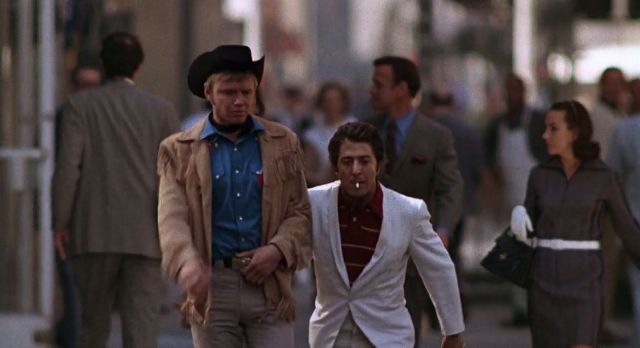Midnight Cowboy (1969) 
“Whatever you hear about Midnight Cowboy is true.”

Director: John Schlesinger
Cast: Dustin Hoffman, Jon Voight, Sylvia Miles
Synopsis: A naive male prostitute and his sickly friend struggle to survive on the streets of New York City.
Despite the anomaly that was the Summer of Love, the late 1960s saw the tearing down of old ideologies and principles, and the emergence of a cynical and materialistic world in which the prime consideration was to look out for number one (‘take it easy – but take it,’ advises the radio which is semi-permanently glued to cowboy Joe Buck’s ear). Hollywood was quick to reflect this seismic shift in personal values, finally shedding itself completely of the failing constraints of the archaic Production Code which had been in force since the 1930s. Nothing gives rise to excess like a sudden, unfamiliar freedom, and for a while the American movie industry gorged itself on the pleasures that had previously been denied it. Sex and violence seemed to become became mandatory almost overnight, and expletives riddled every working and wannabe screenwriter’s script. America had finally acknowledged the underbelly it had wilfully ignored for decades, and those movies which refused to revel in it cast a sardonic eye over all that excess instead. One of the best of those movies was John Schlesinger’s Midnight Cowboy, a film that is prescient and relevant – when it’s not hopelessly dated, that is.
Joe Buck (Jon Voight) forsakes his dead end job washing dishes in a diner in his small Texas home town to make a living as a hustler in New York, where rich old ladies are just waiting for a young buck like him to make their lives complete. He takes the bus out of town, and the familiar sights trigger memories that hint at a dark underbelly to that good ol’ boy geniality of Joe’s. There’s no doubting that he’s a product of his upbringing, and Joe’s memories of those formative years carry a suggestion of sexual abuse at the hands of a slatternly grandmother – which just might explain why Joe considers himself certain to succeed in servicing all those unfulfilled wealthy ladies of a certain age in the Big Apple.
Of course, Joe is completely unprepared for the fast, impersonal pace of life in New York, and his efforts at scoring with the ladies falls flat when his only conquest, a blowsy middle-aged woman (Sylvia Miles), ends up cadging $20 off him for a cab fare across the city. Drowning his sorrows in a bar, Joe gets to talking with a seedy little man named Ratso (Dustin Hoffman), who tells Joe that he knows just the man to manage his faltering career as a hustler. But Ratso leaves him in the care of a half-demented religious nut (John McGiver), whose fervour triggers another set of memories for Joe which are considerably darker than those we saw when he was leaving his home town. Things only get worse when Joe is locked out of his hotel room for not paying his bill, and then suckered out of payment for services rendered by a teenager (a young Bob Balaban). Eventually, Joe is re-united with Ratso, who gives him shelter in his filthy squat in a derelict building situated in the heart of the City’s slums. Although the life shared by the two men is one of grim squalor that grows progressively worse, a bond appears to be growing between them just as Ratso’s already frail health rapidly begins to deteriorate.
Joe Buck is certainly one confused puppy when it comes to his sexuality and his idea of what it means to be a man. There’s no doubt this confusion arises in part from his relationship with his Grandmother whose behaviour appears to have alternated between loving indulgence and neglect, depending on whether she had a beau or not, and whose attentions were not always entirely appropriate. Combine this with a possibly repressed homosexuality and it’s hardly surprising that Joe’s ostensibly simplistic outlook masks a much darker persona which perhaps explains why his idea of personal fulfilment is so skewed. By contrast, the low-life character of Ratso, played with a contained intensity by Hoffman, a man crippled not only by his deformed leg but by his impoverished upbringing, has a simple ambition which is conventionally wholesome – to escape from the city which has so attracted Joe, and grow strong in the warmth of the sun.
While their two characters are diametrically opposed in almost every respect, Voight and Hoffman deliver performances of equal complexity and conviction. In a way, it needed an unknown like Voight to play the part of Joe; someone with whom the audience was unfamiliar, so that the truth and depth of his character could be gradually exposed without the actor’s previous work colouring the audience’s interpretation. While certain elements of the movie – in particular that Andy Warhol-style party – have dated pretty badly, the two leads performances still shine, and it’s no wonder Voight and Hoffman found themselves competing for the Best Actor Oscar in 1970. The movie itself stands the test of time thanks largely to the depth of its characterisation, its unflinchingly raw portrayal of life on New York’s streets, and the diverse range of often damaged individuals who haunt them.
(Reviewed 30th November 2013)
httpv://www.youtube.com/watch?v=jnFoaj8utio
